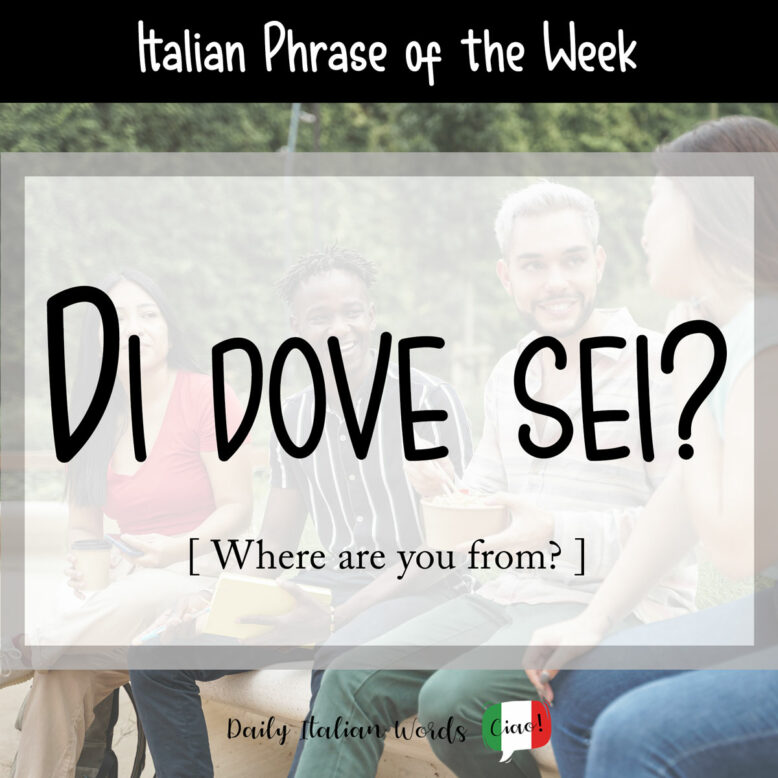If you happen to make some Italian friends whilst travelling around or living in Italy, at some point in the conversation you can expect them to inquire about your place of birth.
The informal way to ask this question is:
Di (of) + dove (where) + sei (second person of verb essere ‘to be’)?
Where are you from?
(Literally: Of where you are?)

Tu sei translates as you are but because subject pronouns can be dropped, Italians rarely say tu unless it is for emphasis or to avoid ambiguity.
Also note that in Italian, the preposition di (of) comes at the beginning of the question whereas in English, from comes at the end.
The phrase above is appropriate between young people of the same age, even if they barely know each other. But if you are addressing an older person or someone of a higher status than yourself, you will need to use the formal version:
Di (of) + dov’è (where + third person of verb essere ‘to be’) + Lei (formal ‘you’)?
Where are you from?
(Literally: Of where you are?)
In this case, the personal pronoun Lei (formal ‘you’) hasn’t been dropped, not because the subject isn’t clear, but because it is more polite to include it.
Note: If you want to use the polite form, you can add Lei to the beginning or end of the phrase: Di dov’è Lei? or Lei di dov’è?
Note that dove (where) has been abbreviated to dov’ because the following verb è (is) is a vowel.
To respond to either of these questions, you can simply say:
Sono (first person of verb essere ‘to be’) + di (of) + Torino (city name).
I am from Torino.
(Literally: I am of Torino.)

- Sono di New York. = I’m from New York.
- Sono di Londra. = I’m from London.
- Sono di Toronto. = I’m from Toronto.
Important: It is also possible to say Io sono di… with the pronoun io ( I ) but once again, Italians tend to drop subject pronouns unless they are needed to avoid ambiguity.
If you want to say which country you’re from, rather than which city, the most natural thing to do is to state your nationality:
Sono (first person of verb essere ‘to be’) + italiano (nationality).
I’m Italian.
- Sono canadese. = I’m Canadian.
- Sono americano/a. = I’m American.
- Sono giapponese. = I’m Japanese.

An alternative way of posing this question is to replace the verb essere (to be) with the verb venire (to come) and substitute the preposition di (of) with da (from). Below is the informal and formal way of posing this question:
Da (from) + dove (where) + vieni (second person of verb venire ‘to come’)?
Where do you come from?
(Literally: From where you come?)
Da (from) + dove (where) + viene (third person of verb venire ‘to come’) + Lei (formal ‘you‘)?
Where do you come from?
(Literally: From where you come?)
In response to either of these questions, you can say:
Vengo (first person of verb venire ‘to come’) + da (from) + Roma (country / city / region).
I come from Rome.

Important: When speaking about a country or region (not a city or town), the definite article must be used in Italian. The preposition da is combined with the definite article to make dal / dallo / dall’ / dalla / dagli which means from the.
- Vengo da Seattle. = I come from Seattle. (da + nothing)
- Vengo dal Canada. = I come from Canada. (da + il)
- Vengo dagli Stati Uniti. = I come from the United States. (da + gli)
- Vengo dalla Francia. = I come from France. (da + la)
- Vengo dall’Irlanda. = I come from Ireland. (da + l’)
- Vengo dallo Zimbabwe. = I come from Zimbabwe. (da + lo)
Sample Dialogues
A: Ciao, sono Janet. (Hi, I’m Janet.)
B: Ciao Janet, di dove sei? (Hi Janet, where are you from?)
A: Sono americana. Vengo da Los Angeles. (I’m American. I come from Los Angeles.)
A: Da dove viene, signore? (Where are you from, sir?)
B: Vengo dall’Australia ma attualmente vivo a Milano. (I come from Australia but I currently live in Milan.)
A: Io sono di Torino. E tu, di dove sei? (I’m from Turin. And where are you from?)
B: Sono di Firenze. Sono italiano ma mia madre è inglese. (I’m from Florence. I’m Italian but my mother is English.)

Heather Broster is a graduate with honours in linguistics from the University of Western Ontario. She is an aspiring polyglot, proficient in English and Italian, as well as Japanese, Welsh, and French to varying degrees of fluency. Originally from Toronto, Heather has resided in various countries, notably Italy for a period of six years. Her primary focus lies in the fields of language acquisition, education, and bilingual instruction.


